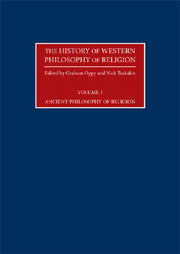Book contents
- Frontmatter
- Contents
- Editorial Introduction
- Contributors
- 1 Ancient Philosophy of Religion: An Introduction
- 2 Pythagoras
- 3 Xenophanes
- 4 Socrates and Plato
- 5 Aristotle
- 6 Epicurus
- 7 The Stoics
- 8 Cicero
- 9 Philo of Alexandria
- 10 The Apostle Paul
- 11 Plutarch of Chaeroneia
- 12 Sextus Empiricus
- 13 Early Christian Philosophers: Justin, Irenaeus, Clement of Alexandria, Tertullian
- 14 Origen
- 15 Plotinus
- 16 Porphyry and Iamblichus
- 17 The Cappadocians: Basil of Caesarea, Gregory of Nazianzus, Gregory of Nyssa
- 18 Augustine
- 19 Proclus
- 20 Pseudo-Dionysius
- Chronology
- Bibliography
- Index
6 - Epicurus
- Frontmatter
- Contents
- Editorial Introduction
- Contributors
- 1 Ancient Philosophy of Religion: An Introduction
- 2 Pythagoras
- 3 Xenophanes
- 4 Socrates and Plato
- 5 Aristotle
- 6 Epicurus
- 7 The Stoics
- 8 Cicero
- 9 Philo of Alexandria
- 10 The Apostle Paul
- 11 Plutarch of Chaeroneia
- 12 Sextus Empiricus
- 13 Early Christian Philosophers: Justin, Irenaeus, Clement of Alexandria, Tertullian
- 14 Origen
- 15 Plotinus
- 16 Porphyry and Iamblichus
- 17 The Cappadocians: Basil of Caesarea, Gregory of Nazianzus, Gregory of Nyssa
- 18 Augustine
- 19 Proclus
- 20 Pseudo-Dionysius
- Chronology
- Bibliography
- Index
Summary
Although Epicurus (341–270/71 bce) was born and bred an Athenian citizen, he did not set up permanent residence in Athens until 306 bce. He grew up on the island of Samos in the Aegean (then an Athenian colony) and moved to Colophon in Asia Minor after the Macedonian Perdiccas had expelled the Athenians from Samos in 321. It was in Colophon that Epicurus received his early and formative philosophical training from Nausiphanes of Teos, a philosopher who had espoused Democritean atomism and who held that the goal of the individual in life was akataplēxia, the ability to maintain composure. After his move to Athens Epicurus purchased a house, where he and his close associates lived, and a kitchen garden near the Academy, where he gave his lectures (whence the term ‘The Garden’ to denote Epicurean philosophy). As a philosophical school, Epicureanism was remarkable for including both women and slaves as members, although the chief positions were held by men. Epicurus died in 271; the school in Athens continued after his death as did other communities that had been established in various parts of the Greek-speaking world.
According to one of Epicurus' ancient biographers, what impelled Epicurus towards a life of philosophy was the inability of his teachers to explain what Hesiod meant by ‘Chaos’. According to another, he started out as a schoolteacher himself but turned to philosophy after coming across the works of Democritus (this presumably under the tutelage of Nausiphanes).
- Type
- Chapter
- Information
- The History of Western Philosophy of Religion , pp. 93 - 104Publisher: Acumen PublishingPrint publication year: 2009

